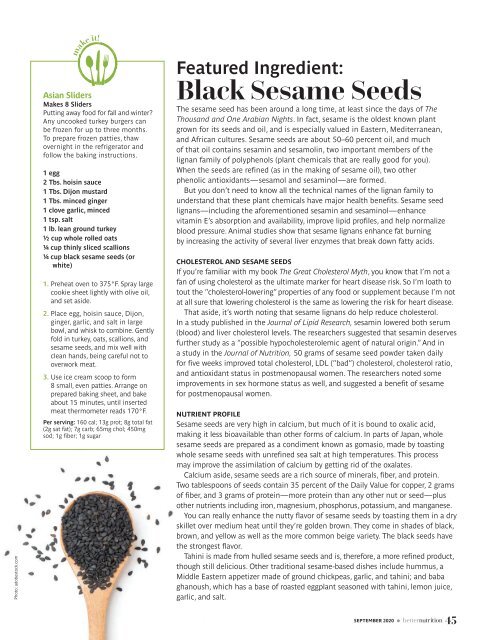You also want an ePaper? Increase the reach of your titles
YUMPU automatically turns print PDFs into web optimized ePapers that Google loves.
Photo: adobestock.com<br />
make it!<br />
Asian Sliders<br />
Makes 8 Sliders<br />
Putting away food for fall and winter?<br />
Any uncooked turkey burgers can<br />
be frozen for up to three months.<br />
To prepare frozen patties, thaw<br />
overnight in the refrigerator and<br />
follow the baking instructions.<br />
1 egg<br />
2 Tbs. hoisin sauce<br />
1 Tbs. Dijon mustard<br />
1 Tbs. minced ginger<br />
1 clove garlic, minced<br />
1 tsp. salt<br />
1 lb. lean ground turkey<br />
½ cup whole rolled oats<br />
¼ cup thinly sliced scallions<br />
¼ cup black sesame seeds (or<br />
white)<br />
1. Preheat oven to 375°F. Spray large<br />
cookie sheet lightly with olive oil,<br />
and set aside.<br />
2. Place egg, hoisin sauce, Dijon,<br />
ginger, garlic, and salt in large<br />
bowl, and whisk to combine. Gently<br />
fold in turkey, oats, scallions, and<br />
sesame seeds, and mix well with<br />
clean hands, being careful not to<br />
overwork meat.<br />
3. Use ice cream scoop to form<br />
8 small, even patties. Arrange on<br />
prepared baking sheet, and bake<br />
about 15 minutes, until inserted<br />
meat thermometer reads 170°F.<br />
Per serving: 160 cal; 13g prot; 8g total fat<br />
(2g sat fat); 7g carb; 65mg chol; 450mg<br />
sod; 1g fiber; 1g sugar<br />
Featured Ingredient:<br />
Black Sesame Seeds<br />
The sesame seed has been around a long time, at least since the days of The<br />
Thousand and One Arabian Nights. In fact, sesame is the oldest known plant<br />
grown for its seeds and oil, and is especially valued in Eastern, Mediterranean,<br />
and African cultures. Sesame seeds are about 50–60 percent oil, and much<br />
of that oil contains sesamin and sesamolin, two important members of the<br />
lignan family of polyphenols (plant chemicals that are really good for you).<br />
When the seeds are refined (as in the making of sesame oil), two other<br />
phenolic antioxidants—sesamol and sesaminol—are formed.<br />
But you don’t need to know all the technical names of the lignan family to<br />
understand that these plant chemicals have major health benefits. Sesame seed<br />
lignans—including the aforementioned sesamin and sesaminol—enhance<br />
vitamin E’s absorption and availability, improve lipid profiles, and help normalize<br />
blood pressure. Animal studies show that sesame lignans enhance fat burning<br />
by increasing the activity of several liver enzymes that break down fatty acids.<br />
CHOLESTEROL AND SESAME SEEDS<br />
If you’re familiar with my book The Great Cholesterol Myth, you know that I’m not a<br />
fan of using cholesterol as the ultimate marker for heart disease risk. So I’m loath to<br />
tout the “cholesterol-lowering” properties of any food or supplement because I’m not<br />
at all sure that lowering cholesterol is the same as lowering the risk for heart disease.<br />
That aside, it’s worth noting that sesame lignans do help reduce cholesterol.<br />
In a study published in the Journal of Lipid Research, sesamin lowered both serum<br />
(blood) and liver cholesterol levels. The researchers suggested that sesamin deserves<br />
further study as a “possible hypocholesterolemic agent of natural origin.” And in<br />
a study in the Journal of <strong>Nutrition</strong>, 50 grams of sesame seed powder taken daily<br />
for five weeks improved total cholesterol, LDL (“bad”) cholesterol, cholesterol ratio,<br />
and antioxidant status in postmenopausal women. The researchers noted some<br />
improvements in sex hormone status as well, and suggested a benefit of sesame<br />
for postmenopausal women.<br />
NUTRIENT PROFILE<br />
Sesame seeds are very high in calcium, but much of it is bound to oxalic acid,<br />
making it less bioavailable than other forms of calcium. In parts of Japan, whole<br />
sesame seeds are prepared as a condiment known as gomasio, made by toasting<br />
whole sesame seeds with unrefined sea salt at high temperatures. This process<br />
may improve the assimilation of calcium by getting rid of the oxalates.<br />
Calcium aside, sesame seeds are a rich source of minerals, fiber, and protein.<br />
Two tablespoons of seeds contain 35 percent of the Daily Value for copper, 2 grams<br />
of fiber, and 3 grams of protein—more protein than any other nut or seed—plus<br />
other nutrients including iron, magnesium, phosphorus, potassium, and manganese.<br />
You can really enhance the nutty flavor of sesame seeds by toasting them in a dry<br />
skillet over medium heat until they’re golden brown. They come in shades of black,<br />
brown, and yellow as well as the more common beige variety. The black seeds have<br />
the strongest flavor.<br />
Tahini is made from hulled sesame seeds and is, therefore, a more refined product,<br />
though still delicious. Other traditional sesame-based dishes include hummus, a<br />
Middle Eastern appetizer made of ground chickpeas, garlic, and tahini; and baba<br />
ghanoush, which has a base of roasted eggplant seasoned with tahini, lemon juice,<br />
garlic, and salt.<br />
SEPTEMBER 2020 • 45

















